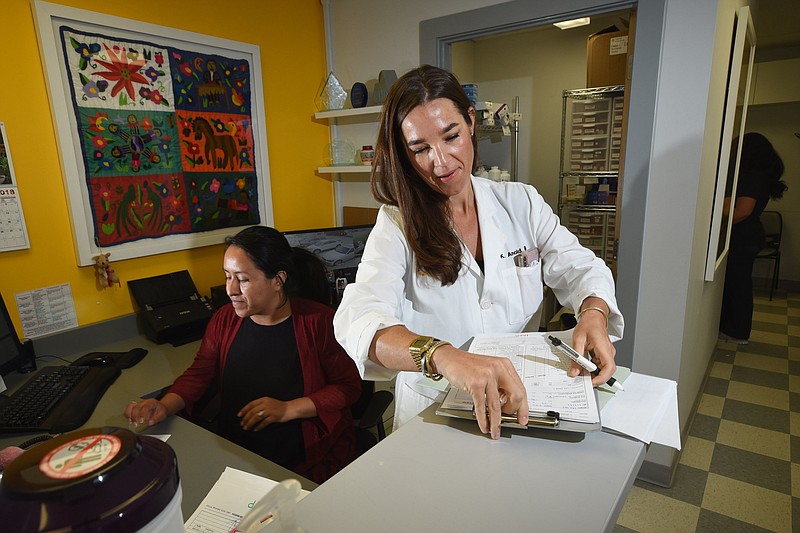In the weeks since medical providers could confirm the coronavirus was spreading in Hamilton County, local officials and service organizations have made a concerted effort to reach Spanish-speaking residents.
The Hamilton County Health Department partnered with La Paz Chattanooga. The county's COVID-19 hotline has bilingual staff. Press briefings are available in Spanish. Local Spanish radio stations began airing news segments about the virus.
"We have reached extensively to the Hispanic community," said Geraldine Spurgin, cultural and linguistic coordinator with the health department. "We don't want anybody to be left out."
On April 14, the county announced Clinica Medicos as a testing site in a focused effort to reach people without health insurance, a primary care provider or a personal vehicle.
But while Tennessee is applauded for leading its neighbors in coronavirus testing and Hamilton County announces more local testing sites, it is unclear whether the tests crucial to ensuring public safety are reaching all members of the community.
By Thursday, Clinica Medicos completed more than 450 tests for the coronavirus. However, only about a quarter of those tested were patients of the clinic that primarily serves the local Hispanic population. The remaining approximately 75% of the tests were given to new patients to the clinic, most of whom were non-Hispanic, said Dr. Tiffany Meador.
While the health department publishes data related to the race and ZIP codes of positive COVID-19 cases, the health department does not collect similar data on the ZIP codes of who is being tested, so it is unclear whether the county's Hispanic population is being tested at the same rate as other groups.
Whether Hispanic residents in Hamilton County are disproportionately infected with the virus is also unclear. As of Thursday, there were 158 confirmed cases of the coronavirus in Hamilton County, 18 of which (about 11%) were Hispanic residents. According to 2018 U.S. Census data, though, about 6% of the county's population is Hispanic, making it appear as though Hispanics are twice as likely to be infected.
However, using census data and forecasting, La Paz estimates the growing Hispanic community is actually around 20% of the county's population, said Vivian Lozano-Sterchi, director of social impact.
(READ MORE: Drop in children's health insurance coverage worries doctors and advocates)
Advocacy groups and the health department have pushed hard to ensure they are getting the most accurate information to residents who may lack access to the internet or have difficulty understanding English.
But for the nonprofits, addressing the health impacts of the virus is one of several struggles they see area residents facing.
In Chattanooga, and throughout the country, the coronavirus continues to emphasize existing economic and health disparities between those who do and do not have reliable transportation, internet, stable employment, documentation and underlying health conditions.
Area residents who are undocumented or are part of mixed-status families - meaning one parent is a citizen and one is not, for example - are not eligible for relief money from the government, despite paying taxes and being disproportionately affected by layoffs related to the ongoing COVID-19 pandemic.
"Mixed-status families are immediately nixed from any relief," Lozano-Sterchi said. "So what we are seeing is that a large population in Hamilton County did not get any relief and they're really concerned because it's been two months without any money coming in."
At the same time, Hispanic Americans are more likely than white Americans to be very concerned about getting the coronavirus or their family members getting the coronavirus. They are also more likely to be very concerned about being able to receive health care or losing their jobs because of the virus, according to a joint report released on Friday from researchers at Northeastern University, Harvard University and Rutgers University.
La Paz began the Latinx Relief Fund to provide cash assistance to people who are struggling. The one-time $500 payment has helped 41 families so far, though the maximum 60 families the fund could help will soon be receiving payments. The waiting list keeps growing, primarily for rent relief, since many local families are ineligible for unemployment insurance, Lozano-Sterchi said.
"A lot of what we are doing is trying to provide the services that a government agency would or should," she said.
Immigrants may even shy away from programs they are eligible for over fears that doing so will hurt their ability to receive a visa under the U.S. Department of Homeland Security's "public charge" test, which weighs an immigrant's economic resources to determine whether that person will need public assistance in the future.
U.S. Citizenship and Immigration Services announced people regardless of documentation with COVID-19 symptoms should seek medical care and doing so would not be used against them during a public charge test.
Undocumented residents are wary to interact with the government because of federal and state legislation in the past that has targeted them, said Judith Clerjeune, policy and legislative affairs manager for the Tennessee Immigrant & Refugee Rights Coalition.
Before COVID-19, immigrants were often unable to raise concerns about workplace safety for fear of having managers use their immigration status against them.
This month, two managers of the largely Hispanic mobile home park Auburn Hills in Ooltewah were arrested for hoarding donations for residents intended to help after the park was destroyed by the tornadoes earlier this month.
As the state reopens in the coming weeks, governments need to pass measures to ensure worker safety and protect them if their employers are not following safety guidelines, Clerjeune said.
"I think especially now, as the state is thinking about reopening, we need to make sure that all workers have access to the personal protective equipment and other safe working conditions that they need so that all of our communities can remain safe," she said.
Contact Wyatt Massey at wmassey@timesfreepress.com or 423-757-6249. Follow him on Twitter @news4mass.
